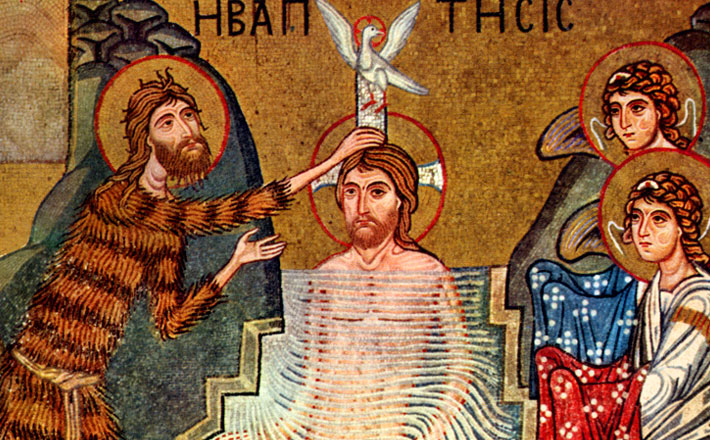Commentary on Acts 19:1-7
Luke-Acts is a two-volume work by the same anonymous author, as in the case of other Gospels in the New Testament.
For convenience, we will call the author of this two-volume work Luke. While the Gospel of Luke narrates the distinctive story of Jesus from Galilee to Jerusalem, Acts tells the story of the early church from Jerusalem to Rome.
In all this story of Jesus and the church, the central figure is Jesus, who was born as a Savior in the city of David (Luke 2:11), seeking out the lost and saving them (Luke 19:10; see also 4:16-30), dying a prophetic death, asking God to forgive those who do not know what they are doing to him, being raised from the dead, promising to send the Spirit in his absence, and returning to heaven. At Pentecost, the Holy Spirit came upon the disciples who gathered in Jerusalem (Acts 2:1-13). Afterwards, thousands of people returned to God through the preaching of Peter and other disciples; they repented of their sins, were forgiven, baptized in the name of Jesus, and received the Spirit.
The good news of God spread quickly to other regions because of persecution, reaching Samaria and other Gentile areas. From Acts 9 on, Paul takes up the role of Peter and becomes the most influential Christian missionary at an international level. Acts 19:1-7 falls within this long missionary journey of Paul (Acts 15:36-22:21). In this passage, we learn of Paul’s concern about some disciples in Ephesus and how that concern was well communicated with them, step by step. The topic of this passage is the Spirit and baptism. In the following, we will study the context and message of this passage.
Apollos in Corinth (19:1)
According to Acts 18:24-28, Apollos ministered in Ephesus. He was a Jew from Alexandria, known as a hub of Judaism in the diaspora world. He was an eloquent speaker, knowing the scriptures very well, being well informed in the way of the Lord, and teaching accurately and enthusiastically the things concerning Jesus (18:24-25). In 19:1, we are told that while Apollos is in Corinth, Paul visits Ephesus and finds some disciples who knew only the baptism of John.
Interestingly, we are also told earlier in Acts 18 that Apollos also knew only the baptism of John (Acts 18:25). So, it is necessary to comment on the correlation between Apollos and some disciples whom Paul finds in Ephesus. Observing Apollos’ work in Ephesus, a Jewish couple, Priscilla and Aquila, “took him aside and explained the Way of God to him more accurately” (18:26). Indeed, Apollos knew things about Jesus accurately, but from the perspective of this Jewish couple, he needs more accurate knowledge about Jesus and explanation of “the Way of God.” This echoes “the Way of the Lord” in which Apollos had been instructed in 18:25.
It is hard to know whether Apollos’ understanding of “the Way of the Lord” is (dis)similar to the Jewish couple’s (Priscilla and Aquila) view of “the Way of God,” given the information that Apollos knew only the baptism of John. However, “the Way of God” points to the importance of God’s ushering of the Spirit that came upon Jesus at his baptism, on the disciples in Jerusalem at Pentecost, and now on all who repent and are baptized in the name of Jesus. That is, Priscilla and Aquila help Apollos see the big picture of God’s mission through Jesus and the Spirit together. Now what can we say about some disciples in Ephesus who told Paul that they were baptized only into John’s baptism (19:3)? The answer implies that they did not know the true meaning of Christian baptism, which is through Jesus. As a result, they receive the Spirit.
Paul came to Ephesus (19:1)
Paul as a traveling missionary makes careful, strategic choices about his mission place. He does not try to cover every city in the Roman Empire with his gospel, but goes to big and important cities that give him easy access to many diverse people and cultures. Ephesus is the fourth largest city after Rome, Alexandria, and Antioch.
Paul found some disciples (19:1)
There is no information about some disciples Paul met other than what is given in 19:2-3. They were baptized into John’s baptism, became believers without receiving the Holy Spirit, and even did not hear of the Spirit. While we need not think that they are the disciples of John the Baptist or those of Apollos, what we know from this information is that they are uninformed about the Holy Spirit and yet they became believers.
Conversation between Paul and some disciples (19:2-4)
So, Paul invites them to have a conversation with him. He says, “Did you receive the Holy Spirit when you became believers?” and they answer, “No, we have not even heard that there is a Holy Spirit.” Then, Paul asks, “Into what then were you baptized?” They answer, “Into John’s baptism.” Finally, Paul says, “John baptized with the baptism of repentance, telling the people to believe in the one who was to come after him, that is, in Jesus.” Paul’s step-by-step conversations with these disciples are not judgmental but aim to understand them clearly.
Before this conversation begins, Paul found them as they were part of the church. Watching or finding those who need help drives him to engage with them. It is like the shepherd in the parable of the lost sheep (Luke 15:3-7; see also 15:11-32). They became believers and yet not fully functional because they did not receive the gift of the Holy Spirit.
While we do not know their identity or social location, they may belong to the group of people further marginalized by ethnicity or class. After gaining the basic information about “some disciples,” Paul explains that John’s baptism is about God, Jesus, and the Spirit. John testified about Jesus, who received the Holy Spirit and worked as the Messiah. Now the same Spirit comes to all who turn to God, repent of their sins, and are baptized in the name of the Lord Jesus.
On hearing this, they were baptized in the name of the Lord Jesus (19:5)
The disciples took action and were baptized in the name of Jesus. Their voluntary response to Paul implies that they were thirsty for the Spirit, as they were lost somewhere in their faith. They could not resolve problems by or for themselves. Now with Paul’s help, they are baptized in Jesus’ name and find the true meaning of baptism. It is not merely about the forgiveness of sins as in John’s water baptism, but about Jesus in whose name one may be reborn with the Spirit. Rebirth in Jesus’ name means one must follow his way. In other words, baptism is not a mere ritual but an event of transformation that needs Jesus who came to seek out and to save the lost.
Laying on of hands, the Holy Spirit’s coming, and its manifestation (19:6)
Paul’s laying on of hands signifies that he participated in the work of the Holy Spirit, who confirms the love of God and the grace of Jesus. The Holy Spirit came to them not because of Paul’s hands but because of the disciples’ submission to God through Jesus. As the Spirit leads Jesus to bring good news to the poor and proclaim release to the captives (Luke 4:18), they must be led by the same Spirit of God as they follow the Lord Jesus. The Spirit equips them with the gifts of speaking in tongues and prophesying. These gifts are needed to do the work of God through Jesus and the Spirit. Luke thinks these gifts are the most typical sign that God’s Spirit works with his people. But we should not limit the work of the Spirit or the manifestation of the Spirit to only speaking in tongues and prophesying.
Altogether there were about twelve of them (19:7)
The number of “some disciples” may point to the twelve disciples of Jesus or the twelve tribes of Israel. It implies that Jesus works through these disciples to achieve God’s end-mission for the world, as he says in Acts 1:8: “But you will receive power when the Holy Spirit has come upon you; and you will be my witnesses in Jerusalem, in all Judea and Samaria, and to the ends of the earth.”


January 10, 2021